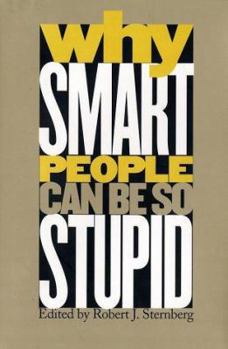Why Smart People Can Be So Stupid
Select Format
Select Condition 
Book Overview
One need not look far to find breathtaking acts of stupidity committed by people who are smart, or even brilliant. The behavior of smart individuals--from presidents to prosecutors to professors--is... This description may be from another edition of this product.
Format:Hardcover
Language:English
ISBN:0300090331
ISBN13:9780300090338
Release Date:April 2002
Publisher:Yale University Press
Length:272 Pages
Weight:1.28 lbs.
Dimensions:0.9" x 6.5" x 9.6"
Customer Reviews
1 rating
A Rationalists Guide to Stupidity ?
Published by Thriftbooks.com User , 21 years ago
Whether one believes acting stupid to be the antithesis of acting smart or intelligently [most of us?], or perhaps prefers to regard stupid behaviour as foolishness in the face of misplaced wisdom [Sternberg], this volume brings together a rich diversity of approaches and opinion to one of life's persistent questions. Some 15 authors gather here in an attempt to inform the reader what stupidity and smartness consist in, whilst providing a breadth of examples from both the empirical literature (laboratory studies, psychometric survey) and the popular press (typically involving embarrassed politicians). Over the course of some eleven chapters, a number of recurrent themes and proposals address the ways in which stupid behaviour might best be characterised, identified or defined, but of more interest (at least to me) was to also find a number of attempts to explain the behaviours so described. A number of the contributors point (directly or indirectly) to particular instances of `stupidity' which may well have been construed as having demonstrated adaptive, rather than maladaptive behaviour under different circumstances. In this respect, the reader is repeatedly lead to the view that personal trait labels such as smart, intelligent or stupid, should be viewed as context dependant terms, if not entirely context-specific, characterisations of human behaviour. In short, what might be considered stupid behaviour under one circumstance, might well be considered smart behaviour in another. So, why do these authors think that smart people can be so stupid? Whilst psychometric correlates of the `smart' and `intelligent' are cited throughout the book (high IQ, high `G'-factor, either high or low scoring on various personality inventory components), no convincing data is presented in an attempt to directly correlate any independent measure of `stupidity' with psychological theory. As a result, perhaps, a significant number of this volume's authors sought to explain `stupid behaviour' as a person'sfailure to adapt to novel circumstances. However, this does little more work than to merely restate the antithesis: that `good' intelligence ontologically scaffolds in response to the need for increasingly flexible, dynamic behaviours in the face of challenges beyond the ken of one's current (and likely more reflexive) response repertoire. Using examples from business and industry, at least two chapters [Wagner and Austin & Deary] remind us that circumstances involving unfamiliar, ill-formed or poorly-defined problem spaces will more likely result in decisions thought stupid in hindsight, but they also point to conflict management as being a significant variable. Such findings serve to inform us that our attempts to transfer template problem-solutions (or indeed any previously successful habits of mind) to novel situations may later prove to have been a poor strategy (think Chamberlain & Hitler), or even complete folly (think Clinton & Lewinsky). Sociopersonal






